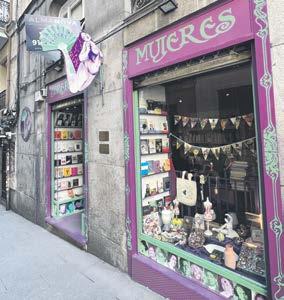
5 minute read
CHANGE
some questionable statements about women’s working roles. And when it comes to the workplace itself, the proportion of women in managerial positions remains around a third of that of men with the numbers dropping even further as careers progress. There is work
HOW TO BE A ‘GOOD WIFE’: A
to do and Spanish women earn around 10% (about €6,000) less per year than men and occupy more than 70% of part-time contracts. Of
1950’s pamphlet these women, 46% affirm they are part-time because they care for dependents or cannot afford childcare services.
WHEN chemistry graduate Robina (Valladolid, 1965) joined Vitoria’s Michelin factory in 1988, she was the only woman there. Now she’s the first female boss for Iberia, responsible for a €2.6 billion turnover and 7,300 employees – most of whom (despite her sterling example) are men. ‘It is difficult for us to find women to fill mechanical positions,’ she says, blaming childhood stereotyping that leads to the notion there are things that girls just don’t do.

GO-GO FRANCO
CARNIVAL organisers who warned participating floats against playing sexist songs during their parades have been likened to officials from the Franco era.
Those taking part in the amazing orgy of fancy dress, street parades and pageantry were told they could lose their public subsidies if they played songs on a proscribed list.
The festival, held each February, is a huge event in the community that inspires young and old, but there have long been accusations that it harbours a dark side that seems to revel in chauvinism.
Accordingly, in recent years there has been a groundswell of public support to combat this by town halls in Catalunya.
Reading between the lines
Nothing can show how far women’s rights have moved forward from the female author censorship of the Franco era, than to have an all female bookshop in the heart of the capital.

Glass Ceilings
Winning women the vote had opposition from a surprising source, writes Dilip Kuner
THE UK has Emmiline Pankhurst, Spain has Clara Campoamor when it comes to icons of women’s suffrage.
Born in Madrid, Campoamor was one of the first women to enter Parliament in Spain and had a long history of feminism and campaigning for universal suffrage.
During the 1931 elections women could not vote but they could stand to be MPs. Campoamor and fellow lawyer Victoria Kent were the only two women elected.
Their work on the Constitutional Committee helped to enshrine the principle that women had the same rights as men in the Spanish Constitution of 1931with one glaring disagreement.
Malaga-born Kent, as a member of the Radical Socialist Republican Party, felt that it was too soon to allow women the vote.
Far left thought at the time was that women tended to be too conservative and in thrall to the Catholic Church and so would most likely vote right wing.
Campoamor, a member of the Radical Party, saw it as a human rights issue and was instrumental in achieving suffrage for women in time for the 1933 elections after ‘winning’ a debate with Kent.
Campoamor and Kent had already shown them-
LAWYER: Kent was one of the first female MPs selves to be an inspiration to women. They were the first two female members of the Madrid Law Association having both broken a glass ceiling by entering university to study law.
Campoamor went into exile during the Civil War and died in Lausanne (Switzerland) in 1972 at the age of 82.
Kent too was exiled and died in New York aged 96 in 1987.
But some have argued that the issue has been muddied by the difficulty in determining which lyrics are actually denigrating to women and which are merely ‘sexy’.
And efforts to root out offending songs harkens back to the censorious days of Franco, according to one organiser.
The song ‘SloMo’, sung by Spanish star Chanel (pictured above), has been flagged as problematic, even though the singer claims to be committed to the cause of gender equality.
The Catalan town of Calafell, along the beach road where hundreds of dancers and floats were getting ready for Carnival, found itself at the centre of the debate.
Sexist
According to Pere Nin, a float organiser, each town has its own list of banned songs, and beforehand, the floats have to give the town the names of the songs it wants to play.
Nin was one of the original organisers who helped draw up the rules against sexist lyrics back in 2019.
“It’s one thing if a song is obviously sexist,” he said. “It’s another when a song has a line or a word that might offend.”
Another much-loved song, ‘Suavemente’, by Elvis Crespo, has also been banned, causing people to question the whole project.
Dancer Sara Coam said there is no room for macho music that objectifies women, while her friend Marta Tamayo said it is more complicated.
“If people would stop listening, the artists would stop writing sexist lyrics,” she said.
DJ Miguel Aguila, who was also on hand, said he is against the bans altogether.
Even instigator Pere Nin is having his doubts, being old enough to remember the dark days of Franco.
“It’s starting to remind me of other periods we’d rather not remember,” he said.
Food price inflation is big news, with rising costs putting a strain on household budgets and driving an increase in food poverty. Is the Spanish government about to subsidise our groceries – and will it help? asks Jo
Chipchase
FIRST the good news: In Spain, at least, we can still find the food we want to buy. Over in the UK, a shortage of both home-grown and imported fruit and vegetables has led to supermarket rationing, in some places. This has been accompanied by a slew of news stories with the UK government claiming it’s the ‘bad weather in Spain’ – much to the amusement of the media here.
As a spokesman for FEPEX, the Spanish federation of exporters, clarified: ‘There are no problems exporting to any countries in the EU’. Quite simply, higher production costs, the UK’s own farming policies and, particularly, Brexit, have caused the problem.
And those higher production costs are also affecting us in Spain. So, while food items are not being rationed here, they are increasingly unaffordable to many people.
To help struggling consumers, Spain’s Unidas Podemos party recently proposed a discount of 14.4% on a set of 20 basic food items. This is similar, in principle, to the 20 centimos per litre discount that applied at petrol stations between April and December.
And now, hot off the press, Spain’s Minister for Agriculture, Luis Planas, assures us that Spain has “the capacity” to introduce measures such as those being implemented in France, where a 2e price cap is being put on basic products.
The Carrefour supermarket chain will offer shoppers in its 5,945 French stores a basket of 200 basic products for under 2e, from March 15 to June 15.
A constant crisis
Planas previously wasn’t so keen on the subsidy idea, saying that inflation has now finally ‘reached a ceiling’ – despite the prices remaining as high as ever.
He pointed out that the government has already introduced VAT (IVA) reductions on certain foods. On January 1, VAT was cut from 4% to 0% on basic items, including bread, milk, eggs, cheese, fruit, vegetables, and cereals. Tax on oil and pasta also fell from 10% to 5%.
However, these foods remain expensive throughout the nation.
According to a recent study by web portal, Trading Economics, Spain’s food cost 15.5% more in January than January 2022 (the rise is even higher in the UK at 17.1%)
A weekly food shop that cost €200 a year ago in Spain now costs €231.

What exactly has risen?
Data from Spain’s National Statistics Institute (INE) confirms that the price of staple foods has reached historic highs.
Around 30 different foods are 10% more expensive than a year ago, including dairy products, such as cheese (22.1%), yoghurt (25.1%), and milk (37.5%).
And it’s really bad news if you like a fry-up: olive oil has risen by 35.2% and eggs by 29.8%.
Meanwhile, rice has increased 21.7%, pasta 19%, bread 15.4%, and breakfast cereals by 11.4%. Vegetables are up by more than 10%.
Maybe it really is time to turn vegetarian: chicken and turkey are up by 15.1%, pork by 13.8% and beef, 13.2%. Frozen fish has increased 13.2% and shellfish, 13.4%.
Why is this so bad?
People with lower incomes, and already stretched families, are disproportionately affected by food price inflation.



